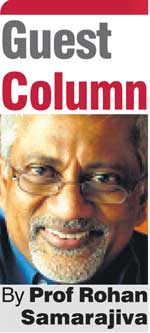Monday Feb 16, 2026
Monday Feb 16, 2026
Thursday, 4 May 2017 00:03 - - {{hitsCtrl.values.hits}}
And democracy requires compromise, even when you are 100 percent right. This is hard to explain sometimes. You can be completely right, and you still are going to have to engage folks who disagree with you. If you think that the only way forward is to be as uncompromising as possible, you will feel good about yourself, you will enjoy a certain moral purity, but you’re not going to get what you want. And if you don’t get what you want long enough, you will eventually think the whole system is rigged. And that will lead to more cynicism, and less participation, and a downward spiral of more injustice and more anger and more despair. 
This is what Barack Obama said at the commencement of America’s most prestigious black university in the last year of his presidency. He was speaking to the young, a group notoriously unwilling to compromise. He was speaking to leaders of movements such as “Black Lives Matter” and “Occupy Wall Street”. He was speaking not only based on his many years of experience as President and before that as a legislator. He was also drawing on his years as a community organiser in Chicago.
In the Sinhala language, there is no single word for compromise. Like we had to coin a new word, a neologism, for regulation back in the 1990s, it appears we will have to create a new word for compromise too.
When a language lacks a word, it begs the question why. Is it that the people who speak Sinhala (I hope to be enlightened about the situation in Tamil) see no need for compromise? Is it another piece of evidence supporting the thesis that we are fundamentally anchored in the primitive feudalism of the Kandyan Era, where there was no democracy, and therefore, no need for compromise or for a word to describe it?
Duty of a democratic government
Let’s forget for the moment about the hypocrisy of getting into medical school on the basis of private tuition and objecting to private medical education. And the hypocrisy of making money through private practice in addition to the salaries and car permits given to them on top of a taxpayer-supported medical education. Let’s concede for the moment that this trade union has a legitimate claim to a seat at a discussion of national policy on who is permitted to supply medical education and credentials.
They are just one group of stakeholders in a complex multi-stakeholder dispute. The Inter-University Federation is another stakeholder. So is Dr. Neville Fernando who built up and then sold Asha Central Hospital in order to invest in SAITM. The students at SAITM and their parents have a legitimate stake in the discussion. It is the duty of a democratically-elected government to reconcile the competing interests of the stakeholders and implement a solution that addresses the national interest and in particular, the interests of the unorganised consumers of curative medical services.
In a democracy, a government cannot satisfy the demands of just one stakeholder group, even in the unlikely event that it is 100% right. It definitely cannot satisfy the demands of a stakeholder group that is intent on destroying the very existence of another legitimate stakeholder. Its decisions must be based on the public interest, in terms of ensuring the best possible curative services for today’s consumers of the services provided by the taxpayer-funded hospitals across the breadth of the country. Its decisions must take into account the future curative and palliative care needs of a rapidly-ageing population.
A democratic government has a duty to give a hearing to all stakeholders. The President himself has given audiences to all stakeholders, including the vociferous Inter-University Federation and the trade union. But that is all. Giving a hearing does not mean the Government must capitulate and implement the demands of the most aggressive stakeholder. That is not democracy.
After all, both major political parties have accepted through words and deeds that non-State actors will be permitted a role in the provision of tertiary education including medical education. The current Government even included such language in its election manifesto. To renege on that mandate given by the people because a trade union unethically threatens to deprive sick people of medical care is the opposite of democracy.
Compromise solution
The Government has listened to all parties. It has evolved a compromise solution that involves the graduates of SAITM agreeing to face an additional examination and for Dr. Neville Fernando to cede his legitimate control over the hospital associated with SAITM. Now it is time for all stakeholders who are willing to work within a democratic framework to cease their protests and pleadings and get back to normalcy.
It is time for a democratic government to say we have given a hearing to all; we have done all that can be done; we have decided in the public interest. Many of the directly affected have compromised. If any group refuses compromise and continues with blocking the roads that belong to the public, if any group seeks to hold sick people hostage through illegal strike action, it is prima facie evidence that they are not willing to work within the democratic system.
At this point, the Government must pay heed to what Karl Popper said:
Unlimited tolerance must lead to the disappearance of tolerance. If we extend unlimited tolerance even to those who are intolerant, if we are not prepared to defend a tolerant society against the onslaught of the intolerant, then the tolerant will be destroyed, and tolerance with them.